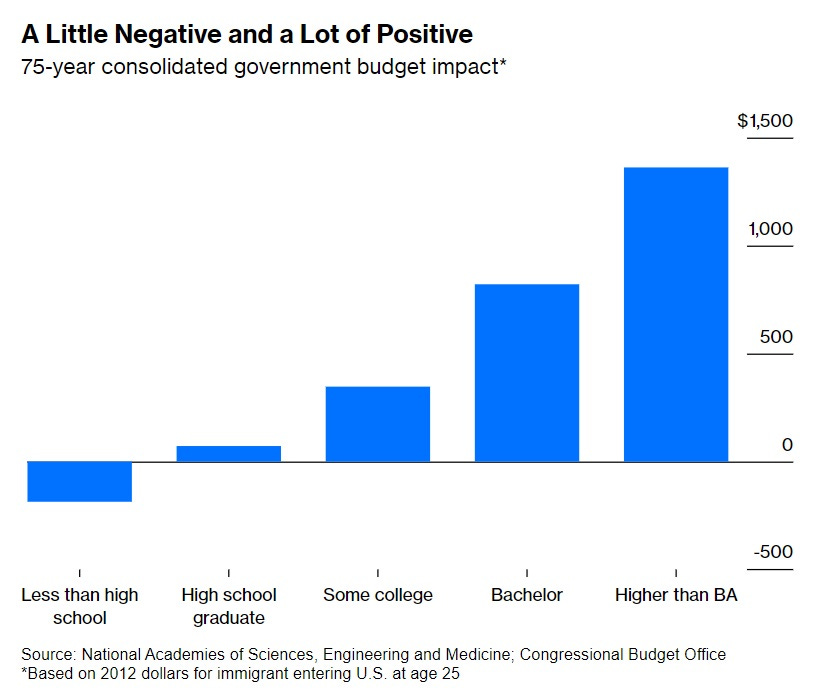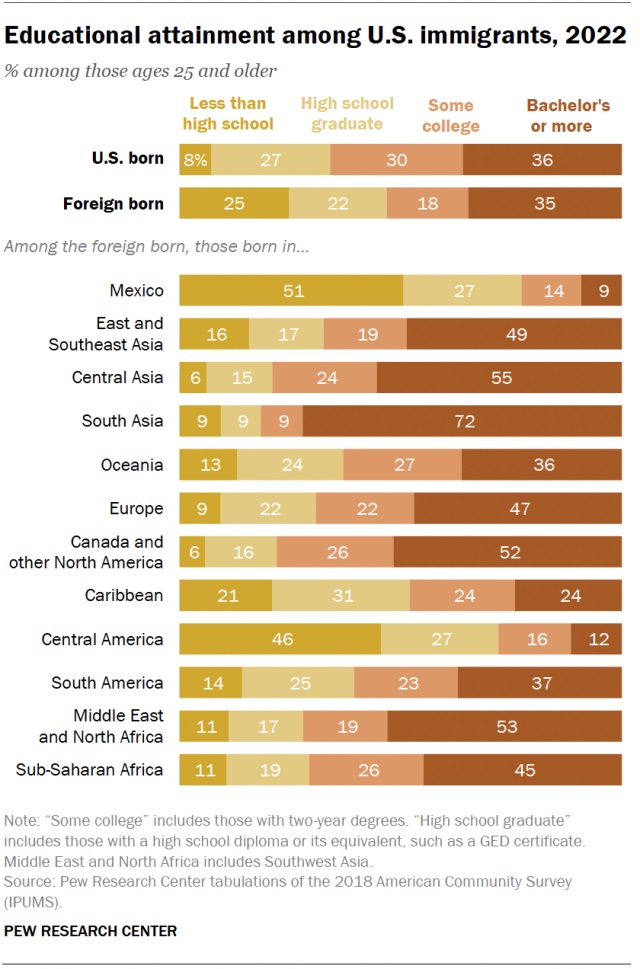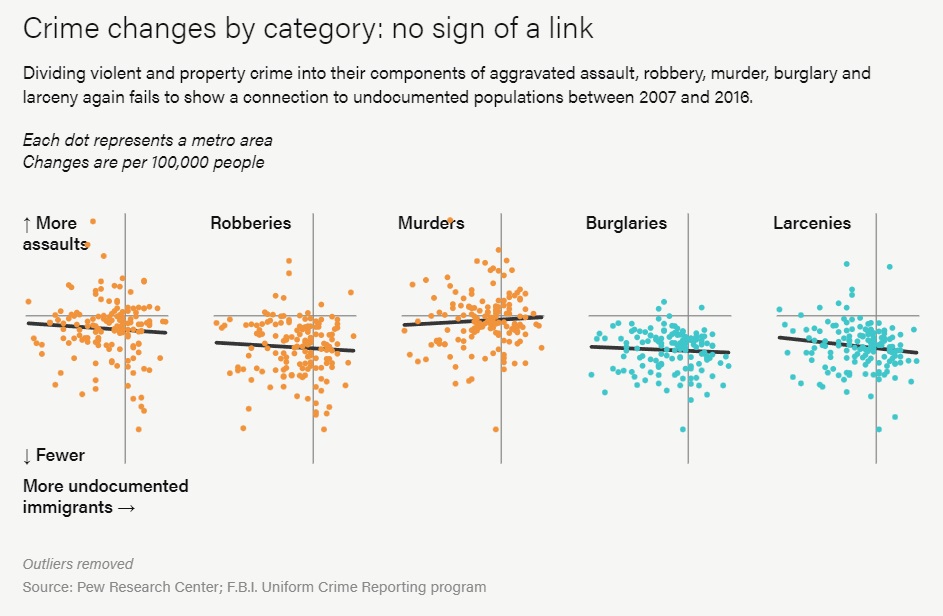Trump’s signature policy would frighten Americans without improving the immigration situation.
“The crops are all in and the peaches are rotten/ The oranges piled in their creosote dumps” — Woody Guthrie
Ever since Kamala Harris replaced Joe Biden and the Democrats shifted to sunny, positive vibes, I’ve started seeing some people criticize the Harris campaign for being light on substance. For example, in his response to my post, Tyler Cowen wrote that “now the Democrats are trying to win with a “brat” and “vibes only” strategy, and no real policy positions.” And Wesley Yang declared that the Dems are running “a vapid, substance free campaign.”
That seems a little unfair to me. Joe Biden has done so much substantive stuff in his four years as President that all Kamala Harris really has to do is promise to stay the course on things like the CHIPS Act, the Inflation Reduction Act, student loan forgiveness/reform, health care subsidies, export controls, friendshoring, tariffs, border controls, etc. in order to be a very substantive candidate. This is not to say I agree with all of those positions, but I think it’s unfair to assume that Harris’ policy program starts from zero with no carry-over from Biden’s. Kamala’s current “vibes only” campaign is really about promising America an exit from the unrest of the 2010s, and right now that’s arguably a lot more important than wonky proposals. Many good substantive things become possible in a calmer, more normal nation.
Meanwhile, we ought to be fair and point out that Trump’s campaign — and the Republican agenda itself — seems notably light on substance. There are really only two important policy proposals: very high tariffs, and immigration restriction. I dealt with tariffs in my last post, so let’s talk about immigration restriction.
Biden has recently gotten tough on the border, implementing restrictions on asylum-seeking that are fairly similar to what Trump did in his first term, and which also seem to have been fairly effective so far. But Trump and his allies are contemplating a far more radical policy: mass deportation sweeps. Here is a Wall Street Journal article from May:
Donald Trump’s allies are drawing up detailed proposals to implement the presumptive Republican presidential nominee’s plans for an unprecedented immigration crackdown, including an effort that would deport asylum seekers to other countries, according to people involved in the effort…
A cadre of former Trump administration officials, Trump supporters and conservative immigration wonks are writing executive orders, policy memos and other documents in a bid to transform campaign rhetoric into policy. The goal, the people said, is to be ready on the first day of a Trump presidency to stem the flow of migrants across the U.S.-Mexico border…and lay the groundwork for what the former president has said would be the largest mass deportation in U.S. history…
In addition to recruiting enough manpower to arrest migrants and opening up enough detention space to hold them…[t]he executive actions that Trump’s advisers are planning are intended to circumvent [legal] constraints [on deportation] without action from Congress.
It isn’t just Trump contemplating these actions. As the article makes clear, a large number of conservative think tanks and advisers are united on the need to plan a mass deportation campaign. Trump’s running mate, JD Vance, has said we should “start with deporting a million people”. Meanwhile the GOP party platform, which I analyzed in a post a month ago, constantly mentions immigration as the root of many or most of America’s ills. A few excerpts (and my apologies for the bizarre capitalization):
[W]e must deport the millions of illegal Migrants who Joe Biden has deliberately encouraged to invade our Country…Republicans will secure the Border, deport Illegal Aliens, and reverse the Democrats’ Open Borders Policies that have driven up the cost of Housing, Education, and Healthcare for American families…The Republican Party is committed to sending Illegal Aliens back home and removing those who have violated our Laws…
Republicans offer an aggressive plan to stop the open-border policies that have opened the floodgates to a tidal wave of illegal Aliens, deadly drugs, and Migrant Crime…Republicans will protect Medicare’s finances from being financially crushed by the Democrat plan to add tens of millions of new illegal immigrants to the rolls of Medicare…Republicans will end luxury housing and Taxpayer benefits for Illegal Immigrants and use those savings to shelter and treat homeless Veterans.
In other words, Republicans — not just Trump! — generally believe that a mass deportation campaign would save Medicare, reduce the cost of housing, education, and health care, improve government finances, and so on.
Pretty much all of that is complete nonsense.
I’m not going to spend too much time doing armchair psychology on the people who think deportation sweeps would make America a paradise. I don’t think it’s that complicated — the conservative movement’s ideas are in flux right now, and the one thing they can all agree on is that they don’t like illegal immigration, and there’s a tendency to blame any and all problems on the thing they don’t like. It’s a little bit like what progressives do with billionaires and corporate power.
But it’s just wrong. Deportation sweeps, even if they were successful, would not make America a better place. The economic benefits would likely be negative overall, while the act of deporting millions of people would just stir up more unrest, fear, and hate. In fact, as America discovered in the 2010s, there are much easier and more effective ways of getting illegal immigrants1 out of the country.
Mass deportation would not reduce the cost of living
Trump’s threat to carry out mass deportations in his first term fizzled out. Deportations were scattered and small in size; in fact, deportations actually fell from where they had been under Obama (for reasons I’ll discuss in a bit). But it’s not utterly inconceivable that a mass deportation campaign could kick a million people out of the country. The U.S. deported that many during the Depression, and about that many again during the 1950s. So let’s assume, for the sake of argument, that Trump’s deportation campaign would succeed in deporting a million people. What would get better?
First, let’s talk about the cost of living. There’s really not much difference between illegal immigrants and any other mostly-low-income immigrants — e.g. refugees — in terms of the economics here. And we have a pretty good idea of how the economics of low-income immigration work.
In 2020 I wrote a post explaining that immigration is both a labor supply shock and a consumer demand shock:
Basically, immigrants A) compete with native-born workers for jobs, but also B) buy a lot of stuff. The stuff they buy requires labor to produce, so immigrants increase labor demand. The empirical evidence — some of which is from an actual U.S. mass deportation campaign in the 50s — shows that when it comes to wages, the increases in labor demand and labor supply roughly counteract each other — immigrants push wages down by competing with locals, but they push wages up by buying stuff, and in the end the total effect on wages is…not much.
So what does this tell us about immigration’s effect on the local cost of living? The exact same logic applies. Immigrants raise consumer demand by buying stuff — housing, health care, food, etc. These prices should go up (and in the case of housing, it definitely does). But at the same time, their labor supply pushes down the cost of lots of other stuff — child care, construction, lawn care, and so on. Prices for those things should go down. The overall effect on the cost of living should be relatively small, just like the overall effect on wages.
Anti-immigration types love to talk about the wage competition from immigrants. But somehow they fail to put two and two together — reducing wages also reduces costs, which drives down the cost of living.
News outlets however, are not ignoring this part of the story. For example, here’s a story from NBC:
Economists increasingly believe that the post-pandemic surge in immigration is a key reason the economy has been able to grow steadily without pushing inflation higher, as the new arrivals have helped employers fill roles at levels of pay that have kept a lid on overall price growth…In a note to clients published Friday, titled “Why we have both strong growth and lower inflation,” Goldman Sachs chief U.S. economist David Mericle said rising immigration had boosted labor force growth. As a result, the strong demand that consumers continue to exhibit elsewhere is unlikely to raise prices by much, “if at all,” he said…The Brookings Institution, a nonpartisan think tank, came to a similar conclusion earlier this month, saying the economy can now tolerate a more brisk pace of job growth without adding to cost concerns.
The surge into the U.S. of immigrants lacking permanent legal status has emerged as one of the most politically charged issues of the 2024 presidential election…Yet the wave of new arrivals has boosted the U.S. economy while helping temper inflation, a top issue for voters…
Normally, the effects of an immigration surge on inflation are a wash or may even increase it in the short term, JPMorgan economists Alexander Wise and Jan Loeys wrote in a note to clients. Besides the purchases by new foreign-born residents, immigration gooses demand from companies that need to buy computers, factory machines, or other equipment for their newly hired immigrant workers, the Dallas Fed paper says…Yet during dire labor shortages, such as the recent episode, immigration may ease inflation because the benefits of expanding the supply of workers outweigh the jolt to household spending, Wise and Loeys suggested…
The immigration wave…”has provided a significant boost to GDP without a corresponding rise in inflation,” says Ron Mau, an economist at the Dallas Fed.
So overall, immigration’s effect on the cost of living — whether positive or negative — is probably very small. That means that a massive deportation sweep is incredibly unlikely to affect the overall cost of living in America. It’ll probably make rent cheaper in immigration-heavy areas thanks to the sudden surge of vacancies, but it’ll probably make food and other goods more expensive nationwide thanks to the sudden shortage of workers.
Mass deportation would not save the government money
What about fiscal costs? Would mass deportation improve the government’s fiscal position? Certainly, big surges of immigration can put a strain on local government finances in the areas that receive them — witness what happened to New York City when red-state governors sent large numbers of asylum-seekers there, and the city struggled to house and care for them all. Local fiscal impacts are a real cost of uncontrolled immigration.
But when it comes to national fiscal impacts, immigrants — even illegal ones — are probably a net positive.
A 2016 report by the National Academy of Sciences found that immigration’s fiscal impact is positive for everyone except the very least-educated immigrants:

Source: Noah Smith
Now, asylum seekers like the ones currently pouring over the U.S.-Mexico border are probably disproportionately likely to not have finished high school. But still, many have! Pew finds that among immigrants from Mexico and Central America, about half have completed high school:

Source: Pew
So the large positive contribution from the more-educated migrants will tend to cancel out the small negative contribution from the less-educated migrants.
Also, it’s possible that the NAS underestimated the positive fiscal impact of low-skilled immigration! Remember that under the welfare reform bill signed by Bill Clinton in 1996, immigrants cannot get most welfare benefits from the federal government. This limits the fiscal downside at the federal level. And people who are in the country illegally get even less. The GOP party platform claims that illegal immigrants are being added to Medicare; that’s simply false. They’re not eligible for Medicare or Social Security.
Colas and Sachs (2020) theorize that the indirect fiscal effects of low-skilled immigration, through the business expansion that their labor allows, compensates for any fiscal drain. And Evans and Fitzgerald (2017) estimate that refugees, specifically, end up contributing about $21,000 more to the government than they take out, over their first 20 years in the country.
So mass deportation might take some fiscal pressure off of some local governments, but would probably make the federal government’s fiscal situation worse.
Mass deportation would not reduce crime
How about crime? Texas keeps records of the immigration status of everyone they arrest, so it’s useful to look at Texas to judge the criminality of illegal immigrants. Light, He, and Robey (2020) find that in Texas, illegal immigrants are arrested for felonies at lower rates than the native-born:
We make use of uniquely comprehensive arrest data from the Texas Department of Public Safety to compare the criminality of undocumented immigrants to legal immigrants and native-born US citizens between 2012 and 2018. We find that undocumented immigrants have substantially lower crime rates than native-born citizens and legal immigrants across a range of felony offenses. Relative to undocumented immigrants, US-born citizens are over 2 times more likely to be arrested for violent crimes, 2.5 times more likely to be arrested for drug crimes, and over 4 times more likely to be arrested for property crimes. In addition, the proportion of arrests involving undocumented immigrants in Texas was relatively stable or decreasing over this period. The differences between US-born citizens and undocumented immigrants are robust to using alternative estimates of the broader undocumented population, alternate classifications of those counted as “undocumented” at arrest and substituting misdemeanors or convictions as measures of crime.
This is pretty good data! But for what it’s worth, the Marshall Project also found that cities that had big surges in illegal immigration didn’t have more crime from 2007 to 2016:

Source: Marshall Project
So mass deportation is unlikely to have much of an effect on crime, either.
In other words, despite the claims of Trump and the GOP, mass deportation is unlikely to yield much benefit for Americans.
Deportation sweeps would frighten Americans and stir up unrest
The economic and security benefits of mass deportation are effectively nonexistent, but it’s also important to consider the costs. Most of these costs are psychological in nature.
Finding people to deport would require deep intrusion into communities across America. To understand why, we have to understand which kind of migrants a mass deportation campaign would target. The people who would be deported by Trump’s policy are not the asylum seekers that get in the news — most of them are now here in the country legally (because they turned themselves in to the Border Patrol and are awaiting their asylum hearings). People who are in the country illegally, and whom Trump’s campaign would target, have mostly been here many years, and are embedded invisibly within cities and neighborhoods across America.
What would it look like for ICE to go into communities across America looking for undocumented people to deport? Well, we know what it would look like, because a few such raids happened during Trump’s first term. For example, in 2019 there was a big raid that deported a few hundred people in Mississippi by targeting their place of work. Here’s how that went:
The deportation sweep Wednesday by hundreds of U.S. Immigration and Customs Enforcement agents at several food processing plants in Mississippi left a trail of tears, business jitters and widespread anxiety in places where undocumented immigrants are so tightly woven into communities that the towns would struggle to exist without them. The raids inflicted predictable suffering — especially among children whose parents were suddenly carted off — to such a degree that just 24 hours afterward, ICE had released some 300 of the 680 migrants it had arrested, including those who had no criminal records.
ICE deportation sweeps were just part and parcel of the general unrest of the late 2010s. Even though most Americans didn’t actually witness government agents charging into factories and stores and homes checking people’s papers, the idea that these sweeps were coming unnerved a lot of Americans. Here’s a story from 2019:
With immigration raids expected to begin Sunday in at least nine major cities, some U.S. citizens are taking precautions, including carrying their American passports at all times…The wary Americans, often Latinos, said they don’t want to get swept up in the planned roundups announced by President Donald Trump.
“I was born in this country,” said David Cruz, communications director for the League of United Latin American Citizens. “I’m a third-generation Texan. I’ve been carrying a passport since the day he was elected.”…
A Los Angeles journalist from Latin America, who did not want his name used out of fear his passport would be flagged, said he began carrying the document with him this weekend. Naturalized in the 2000s, he said recent stories of citizens mistakenly detained by ICE made him think he could be wrongly targeted.
Citizens being forced to carry their citizenship papers with them at all times out of fear of being kicked out of their own country sounds like a story out of the old Soviet Union. In reality the danger was minimal — unlike in the 1930s and 1950s, ICE didn’t just round up a bunch of Hispanic-looking people and send them to Mexico. But racial profiling was common, and the raids that did happen were highly disruptive and often cruel, so the fear is understandable.
Trump’s policies provoked a voter backlash. Public opinion in the late 2010s swung strongly in favor of allowing illegal immigrants to stay. In 2019, support for establishing “a way for immigrants here illegally to stay legally” stood at 67% in Pew’s survey, while support for increased deportation stood at only 54%. Those numbers have since partially reverted, with Trump out of office and the asylum problem worsening again. But it shows how much Americans disliked Trump’s approach to immigration.
Now realize that to deport a million people, as J.D. Vance promised, ICE would have to do 3000 raids the size of the one in Mississippi in 2019 — or many more thousands of smaller raids. The scene of government agents storming through communities, rounding people up, and demanding to see their citizenship papers would become a fairly commonplace one. This would generate a far larger amount of terror and unease among the populace than scattered ICE raids did during Trump’s first term.
Do we really want the next four years to be the late 2010s on steroids? I don’t.
If you want to get illegal immigrants out of the country, we know how to do that
Now that all having been said, I absolutely do sympathize with the people who are fed up with the flood of asylum-seekers sneaking illegally across the border. It’s unfair, it’s chaotic, and it puts a strain on local governments. Even more fundamentally, a country has a right to decide who gets in and who doesn’t — a policy where crossing the border illegally carries zero consequences isn’t quite the same thing as open borders, but I understand why some people conflate the two.
But if we want illegal immigrants to leave the country, we have much better tools at our disposal than mass deportation. In fact, we’ve done it before. From 2007 to 2012, on net, about a million illegal immigrants — most of them from Mexico — left the country. Every estimate seems to agree:

Source: Yale
Of course, the Great Recession had something to do with that, since it meant fewer jobs for migrants. But Barack Obama’s program of deporting immigrants who committed crimes undoubtedly helped.
If we want to reduce the population of people who are in the U.S. illegally, we just need to repeat or scale up the approach of the Obama years. Deporting those who commit crimes is not only much easier than having ICE barnstorm through communities and hunting down law-abiding innocent people, it’s also more selective — by and large, you get rid of the bad apples and keep the good ones.
If we want to accelerate the number of illegal immigrants who leave, the best way to do that is by cracking down on employment of the undocumented. Auditing companies and imposing fines for employing people illegally would be both easier and less disruptive than rounding their workers into vans and carting them away. If it were much harder to get a job in America as an illegal immigrant, far fewer people would make the attempt. Of course, this would result in higher prices for some goods, like food, and slower growth for some U.S. industries. But if that’s a price Americans are willing to pay, then OK.
And of course, all of this is on top of increased border security and restrictions on asylum in the U.S. Those are things that both Trump and Biden have done, and Harris is promising to do. Making it harder to get to the U.S., while also reducing the economic appeal of making the perilous journey, is an obvious way to stem the flood of asylum seekers. (The real fix, of course, is to change asylum law to close the loophole that is now drawing millions of people to sneak across the border.)
Any of these strategies would be far more humane and far more effective than sending government agents swarming through the country demanding to see people’s papers. Trump’s signature policy idea, meanwhile, would be massively doubling down on an approach that failed to remove many illegal immigrants but succeeded in angering the country. Given how few benefits would flow from mass deportations, it just doesn’t sound like the kind of substantive idea we ought to embrace.
This article was originally published in the Noahpinion and is republished here with permission.







